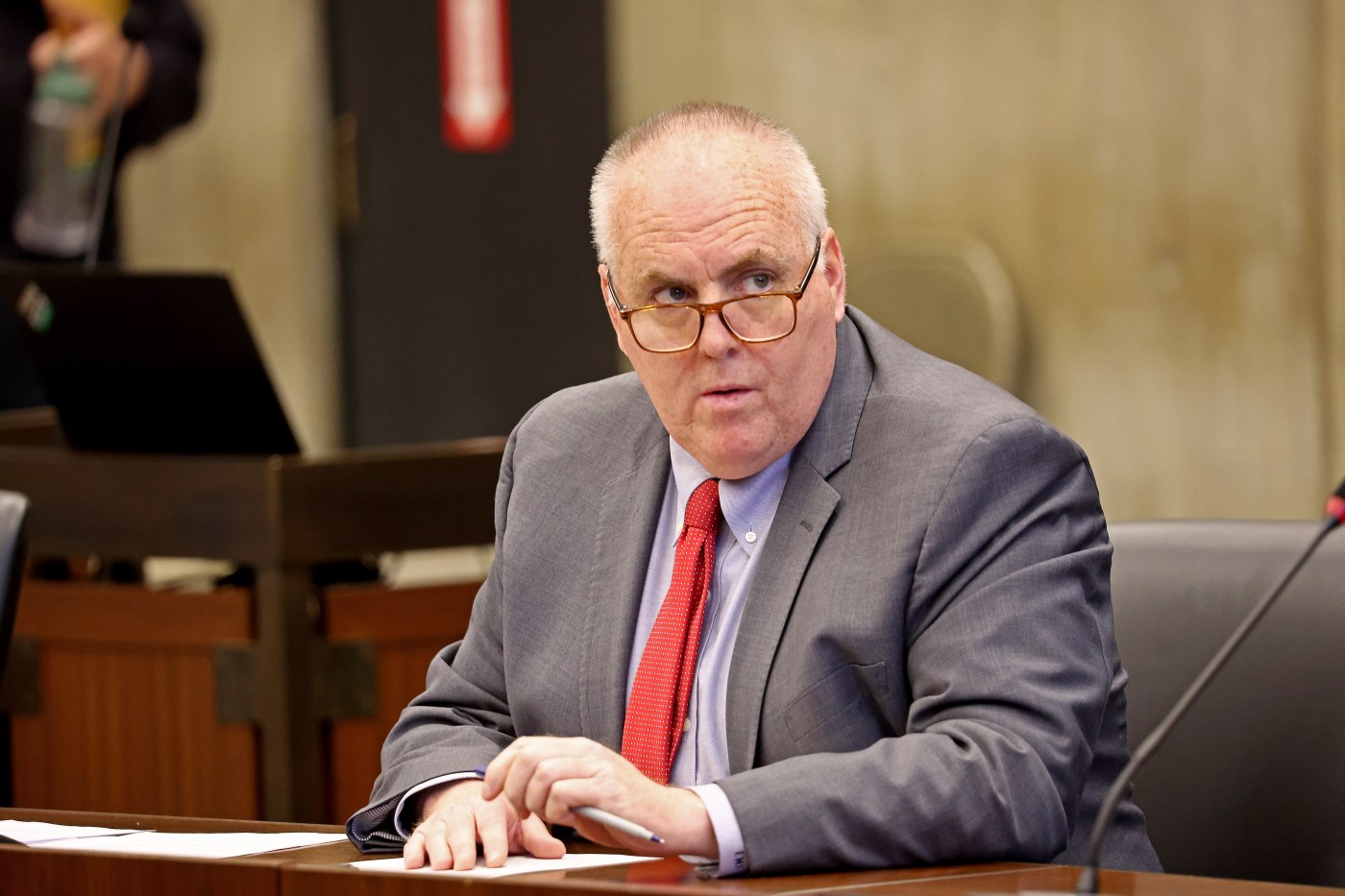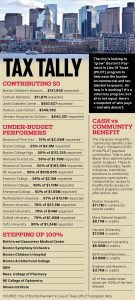
Boston city councilors trade jabs in tax showdown ahead of Wednesday vote
The lobbying and back-biting has already begun on the Boston City Council, setting up a showdown for a major vote that could take place Wednesday on the mayor’s revised bid to raise commercial tax rates.
Councilor Benjamin Weber, who supports the city’s tax plan, sent a newsletter to his constituents Sunday that made multiple references to Councilor Ed Flynn, a critic of the proposal, and his objection to the legislation coming before the City Council last Wednesday — which Weber said delayed tax relief for homeowners.
The remarks in the newsletter, which included Weber encouraging his constituents to lobby Flynn to support the mayor’s plan should it come to a vote on Wednesday, ticked off Flynn enough to write a pointed email to Weber and Council President Ruthzee Louijeune, alleging “inappropriate conduct” and “bullying” from Weber.
“Councilor Flynn has made statements at our meetings and in the press suggesting we haven’t done our due diligence on the home rule petition, but I strongly disagree,” Weber wrote. “We have already held two hearings and a working session on the mayor’s initial proposal … and we will have yet another hearing on the issue on Tuesday before taking the petition up for a vote on Wednesday.”
Also citing the town halls that have been held by Mayor Michelle Wu and the negotiations at the State House that were “openly debated in the media for over four months,” Weber said, “This is what due diligence looks like.”
Weber went on to state in his newsletter that Flynn’s suggestion that the Council is “needlessly rushing through the process” ignores everything that the body has done “up to this point and everything we will do before the next meeting.”
“In addition, the Council must vote on the home rule petition soon because if it passes, it will still require approval from the state legislature and governor prior to January 2025 tax bills going out to residents and commercial businesses,” Weber wrote. “A delay in the City Council will needlessly result in residential tax bills going up dramatically in January.
“If you support the mayor’s proposal, I urge you to call Councilor Ed Flynn to ask that he support the petition and allow us to send it to the State House before time runs out,” he told his readers.
Flynn, who became aware of the remarks made in the newsletter on Monday, sent an email that afternoon to Louijeune, with Weber cc’ed and which was obtained by the Herald, to make her “aware of the conduct” from their shared colleague in his newsletter.
“He instructed his supporters on his email list to call me directly to ask me to support the mayor’s home rule petition,” Flynn wrote, referencing the hearing scheduled for Tuesday and possible vote the next day. “Like the previous home rule petition, this would not require a unanimous vote.
“So to single me out and direct supporters to call me to support it, and mentioning no other colleagues — and also to mislead them into thinking that however I choose to vote on the matter will in some way prevent it from being sent to the State House — that feels like intentional harassment and beyond the pale.
“In serving nearly seven years on the Council, and two as Council president like yourself, I can honestly say that I do not recall any colleague singling out another in a newsletter and directing supporters to influence only one member of the body,” Flynn wrote, adding, “His comments were outrageous and an intentional mischaracterization.”
Flynn referenced “several” other concerning incidents over the past few years that led him to push for an anti-bullying policy, while emphasizing the need for the City Council to “set an example to treat all with dignity and respect” and not “emulate what we see as discourse at the national level.”
“Nothing in Councilor Weber’s actions are anything close to harassment or bullying,” Louijeune said in a statement. “He encouraged constituents to reach out to a councilor who blocked the matter from coming on the agenda last week and who previously voted against the matter. Councilor Flynn’s decision to run to the Herald every time he creates an imagined slight instead of speaking to his colleagues is actually the troublesome and antagonistic behavior.”
Reached for a response, Weber told the Herald he’s been hearing from seniors and other residents who live in his district who are concerned about a 28% quarterly spike in their property tax bills in January.
“It’s my job to advocate for my constituents, and in this case, I think I did just that,” Weber said. “If Councilor Flynn is uncomfortable with the position he’s taken, he should let the public know.”
“I send out a newsletter each week to my constituents to tell them about what is happening at the Council,” Weber added. “In this case, in the past week, Flynn made comments that I thought included misinformation about the tax proposal, and he objected to the proposal coming before us, which delayed any vote we could take, and could potentially run out the clock and leave my constituents to have higher tax bills in January.”
In response to Weber’s assertions of misinformation, Flynn said simply in a statement, “As an elected official and a veterans advocate, I always strive to provide positive and honest leadership.”
Mayor Wu struck an optimistic tone when speaking after an unrelated event Monday about the chances for her proposal making it through the Council, which approved an earlier version via an 8-4 vote. She said the body has had eight months since her initial filing to vet the plan.
Related Articles
Boston City Council reschedules free museum hearing due to Wu administration absences
Boston looks to spruce up disorderly Newmarket neighborhood, home to Mass and Cass
Boston tax hike proposal triggers more fireworks among City Council
Boston City Council to hold emergency meeting on Michelle Wu’s business tax hike plan
CNN drone crash at Celtics watch party: Boston city councilor calls for better safety measures
“It’s the same proposal but with improvements that represent, now, consensus across an even bigger group of stakeholders and community members,” Wu said. “So I hope that this is seen as a strengthened proposal, and that consensus will help us move it forward in the short window that we have.”
The mayor’s initial plan passed the House of Representatives, but stalled in the Senate. It has since been tweaked via a compromise between Wu and a group of business leaders who withdrew their objections after Wu lowered the shift of the city’s tax burden onto commercial properties. The revised deal also reduced the length to three years and targeted tax relief to small businesses.
The latest plan would lower the quarterly tax increase for homeowners from 27.8% to roughly 18% in January, and the annual spike from 14% to about 9%, per city data.
It has been criticized by business stakeholders for raising rates on a commercial sector struggling with falling property values and vacant office space — a scenario also leading to a loss of commercial revenue the mayor says her plan seeks to resolve — and coming at a time when the $4.6 billion city budget grew by 8%.
City Councilor Benjamin Weber (Nancy Lane/Boston Herald, File)


